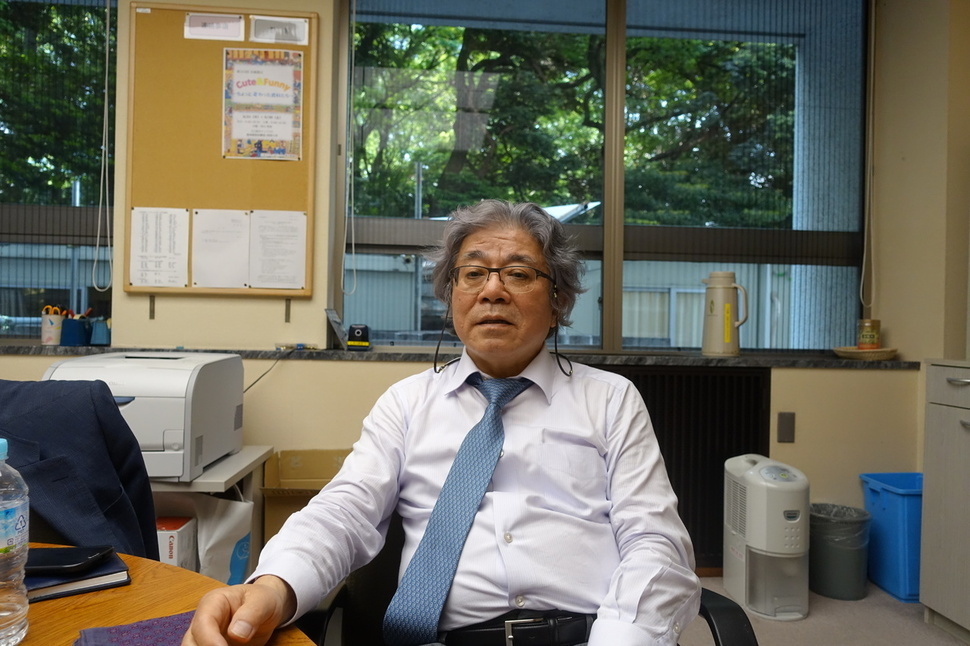 |
|
Professor Emeritus Okonoki Masao of Keio University
|
Keio Univ. professor professor emeritus weighs in on Tokyo’s stance toward the Pyongyang Declaration
The response from the Japanese media regarding the Pyongyang Declaration made between South Korean President Moon Jae-in and North Korean leader Kim Jong-un on Sept. 19 has been overwhelmingly skeptical. They have reported that North Korea has shown clear intention to permanently shut down the Yongbyong nuclear complex, but have emphasized the condition that the US must also take corresponding measures. But Japanese expert on the Korea issue and professor professor emeritus at Keio University Okonoki Masao thinks differently. In a phone interview with the Hankyoreh on Sept. 20th about the third inter-Korean summit on Sept. 18-20, he called it an exceptional example of North and South Korea taking the lead on the issues that face the peninsula. “If there is another breakthrough on the issue of denuclearization like what we saw between North Korea and the US regarding the announcement of a potential declaration of the end of the war, Japan will get involved,” he added. Hani: What is your overall assessment of the third inter-Korean summit and the Pyongyang Declaration? Okonoki: The inter-Korean summit was successful in that it led to a considerably deep conversation about implementing measures for the denuclearization of the peninsula, and the US has also been drawn in. This year marks 70 years since the founding of North Korea as a country, but during all that time, the Korean Peninsula has been the stage for the struggles of foreign powers. North and South Korea haven’t taken the initiative on anything. South Korean leaders played the role of mediator between North Korea and the US, and it was difficult to even imagine a North Korean leader visiting Seoul before now. We can see that President Moon also has the desire to play intermediary between North Korea and Japan. The relationship between North and South Korea is changing drastically, and as a result, progress is being made on the issue of whether or not the peninsula will be denuclearized. Before President Moon, President Kim Dae-jung and President Roh Moo-hyun also held summits with North Korea, but the circumstances are different now. Back then, it wasn’t easy for Kim and Roh to mediate in conversations between North Korea and the US. But since the time that Moon took office, the threat of North Korean nuclear development was more serious than ever before, and an administration like Trump’s is unprecedented. North Korea has also begun to search for ways to survive. This changing situation has enabled South and North Korea to take the initiative on the issues of the Korean peninsula,” he concluded. Hani: The Japanese media is emphasizing the fact that the permanent shutdown of North Korea’s Yongbyon nuclear complex is conditional, depending on corresponding measures from the US. Okonoki: I see the Pyongyang Declaration as an agreement from North Korea not to develop or produce their nuclear capabilities (beyond what they already possess). Of course, US demands don’t stop there. The Pyongyang Declaration does not mention the process of denuclearization. But this is something that North Korea and the United States must discuss. I see the leaders of North and South Korea tackling the issue (of the denuclearization of the Korean Peninsula) together as progress, in and of itself.” Moreover, the Agreement on the Implementation of the Historic Panmunjom Declaration in the Military Domain suggests that the two Koreans have reached a consensus on military issues. The two Koreas have declared the de facto termination of the war (which, more than that of other countries, is the Korean War). This could influence the shape of other statements announcing the end of the war (such as those involving the US and other countries). The war could end not by South Korea, North Korea, the United States and China all coming together to announce the end of the war, but after North and South Korea, the US and North Korea might declare the end of the war, and the process could happen gradually. It’s difficult to predict whether a second North Korea-US summit might happen. However, it is possible to expect a second round of talks before the US midterm elections, at the earliest.” Hani: What is your outlook regarding the possibility of a North Korea-Japan summit? Okonoki: It depends on how the negotiations between North Korea and the US progress. If there is breakthrough on the denuclearization of the Korean peninsula at the second North Korea-US summit, Japan will not be able to remain silent. However, at this stage, Japan will limit its role to observing and analyzing the situation. Japan will be able to make a move once the declaration of the end of the war between North Korea and the US begins to crystalize. The declaration of the end of the war between North Korea and the US cannot stop at the statement itself, but it must accompany a specific denuclearization process from North Korea as well. That would then create the necessity for a summit between North Korea and Japan. Hani: The Japanese government has emphasized that for a North Korea-Japan summit, there needs to be progress made on the abduction issue. Okonoki: The abduction issue is a double-edged sword. A summit needs to produce big results, so there’s a significant political risk. On the other hand, the more progress is made on denuclearization on the Korean Peninsula, the more pressure there will be for a North Korea-Japan summit to resolve the abduction issue. By Cho Ki-weon, Tokyo correspondent Please direct comments or questions to [english@hani.co.kr]






